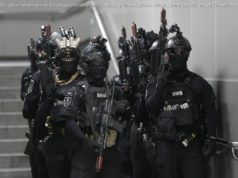China will not be part of next round of talks but both Koreas recognise they still need their neighbour’s support, according to senior envoy in Seoul
South Korea is preparing for talks with the North and the United States to resolve issues on the divided Korean peninsula following Friday’s historic summit, but China will not have a seat at the table initially, according to a senior diplomat in Seoul.
The diplomat, speaking on condition of anonymity, said both Koreas wanted to dilute Beijing’s influence over the peninsula, but they also recognised they needed China’s support because it was still a key player in the region.
Momentum is growing for a peaceful resolution of the nuclear crisis and even reunification after South Korean President Moon Jae-in and North Korean leader Kim Jong-un vowed to end their six decades of hostility, though critics say their agreement lacks the road map or details needed to achieve these goals.
For South Korea, it would be preferable to hold dialogue with the North and the United States, as China’s involvement could diminish its influence over the negotiations.
North Korea’s heavy reliance on China for oil, food and other humanitarian aid put Beijing in a position of control over Pyongyang, the diplomat said. They added that the isolated state could have an alternative in South Korea and the US, if relations with the two countries continued to improve following Friday’s summit and a planned meeting between Kim and US President Donald Trump, expected in May or June.
“Seoul can be the middle man to find common ground between Pyongyang and Washington by helping the two parties to narrow their differences given its close relationship with the US, and also the shared heritage of the two Koreas,” the diplomat said.
A joint declaration released after the summit between Moon and Kim in the fortified border village of Panmunjon on Friday said the two sides would work together to officially end the Korean war this year through trilateral talks with the US, or quadrilateral talks that also involved China.
Other agreements reached included working towards “complete denuclearisation” and a nuclear-free Korean peninsula, restarting reunion programmes for separated families and ceasing all hostile acts against each other.
Although China has a key role on the Korean peninsula as one of three parties that signed the armistice deal in 1953, along with the US and North Korea, and it has long provided political and economic support to Pyongyang, it could become a less significant player if relations between the two Koreas improved, the diplomat said.
“Of course, both Seoul and Pyongyang will notify China [of the outcome of any talks] because we need China’s blessing,” the diplomat said.
China on Friday said it welcomed the positive outcome of the inter-Korean summit and was willing to continue playing an active role in the process. Beijing earlier also said it welcomed efforts by the US and North Korea to improve their relationship.
During the 1950-53 Korean war, Mao Zedong sent nearly three million troops to support the North, with an estimated 180,000 Chinese soldiers killed.
Zhang Liangui, a professor of international strategic research at the Central Party School in Beijing, said it was “foreseeable” that the two Koreas would not want China involved in the talks.
“This was inevitable, because both Koreas have been wanting to cast off Chinese influence,” he said.
John Delury, a professor of international relations at Yonsei University in Seoul, said there was a “certain irony” in the Chinese foreign ministry’s position of encouraging Pyongyang to talk directly to the US about denuclearisation.
“Now the Americans are talking to Pyongyang… and we’re seeing China is nervous, simply because they are not at the table,” Delury said.
But Moon Hee-sang, a South Korean lawmaker with the ruling Democratic Party of Korea, said the trilateral talks with the US would be just “a matter of sequence”.
“After the trilateral talks, four-party talks that include China will definitely take place. China won’t be overlooked – that’s not a concern. China is a signatory to the Korean Armistice Agreement and will take part in future talks to officially end the war and reach a peace agreement,” said Moon, who is also a member of the South Korean parliament’s foreign affairs and unification committee.
“The reason the trilateral talks will come first is because Pyongyang, Washington and Seoul need to sit down and talk through an agreement on denuclearisation before they move on to ending the war or a peace deal.”
He said North Korea would also want China involved in peace talks.
“Pyongyang will feel insecure without China there when it’s negotiating the peace agreement, and it would have requested China’s involvement in the future talks,” he said. “Inter-Korean reconciliation does not mean less Chinese influence – we must pay attention to the geopolitical location of the Korean peninsula.”
Cai Jian, an expert on Sino-North Korean relations at Fudan University in Shanghai, said Pyongyang had tried to pull back from Chinese influence but had failed.
“When the international world has exerted pressure on Pyongyang by increasing sanctions, Beijing has been the only one supporting and protecting it, so it’s impossible for the North to turn its back on China,” he said.
China could also benefit from potential Korean reunification in the future, given the peninsula’s proximity to the northeastern part of the country, Moon Hee-sang said.
“Economic cooperation between the Korean peninsula and China will be strengthened, and so China’s influence on the peninsula will only increase in the future,” he said.
Additional reporting by Liu Zhen






